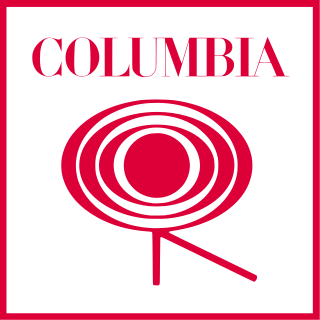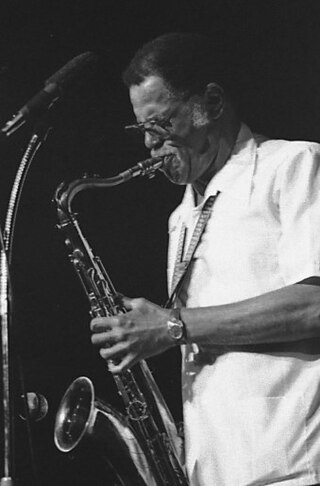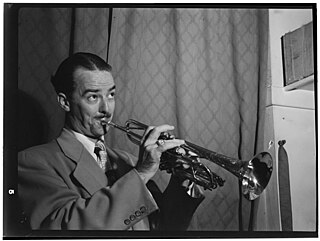
Miles Dewey Davis III was an American jazz trumpeter, bandleader, and composer. He is among the most influential and acclaimed figures in the history of jazz and 20th-century music. Davis adopted a variety of musical directions in a roughly five-decade career that kept him at the forefront of many major stylistic developments in jazz.

Columbia Records is an American record label owned by Sony Music Entertainment, a subsidiary of Sony Corporation of America, the American division of Japanese conglomerate Sony. Columbia is the oldest surviving brand name in the recorded sound business, and the second major company to produce records. From 1961 to 1991, its recordings were released outside North America under the name CBS Records to avoid confusion with EMI's Columbia Graphophone Company. Columbia is one of Sony Music's four flagship record labels: Epic Records, and former longtime rivals, RCA Records and Arista Records as the latter two were originally owned by BMG before its 2008 relaunch after Sony's acquisition alongside other BMG labels.

Dexter Gordon was an American jazz tenor saxophonist, composer, and bandleader. He was among the most influential early bebop musicians. Gordon's height was 6 feet 6 inches (198 cm), so he was also known as "Long Tall Dexter" and "Sophisticated Giant". His studio and performance career spanned more than 40 years.

Kind of Blue is a studio album by the American jazz trumpeter and composer Miles Davis. It was released on August 17, 1959 through Columbia Records. For the recording, Davis led a sextet featuring saxophonists John Coltrane and Julian "Cannonball" Adderley, pianist Bill Evans, bassist Paul Chambers, and drummer Jimmy Cobb, with new band pianist Wynton Kelly appearing on one track—"Freddie Freeloader"—instead of Evans. The album was recorded in two sessions on March 2 and April 22, 1959, at Columbia's 30th Street Studio in New York City.

OKeh Records is an American record label founded by the Otto Heinemann Phonograph Corporation, a phonograph supplier established in 1916, which branched out into phonograph records in 1918. The name was spelled "OkeH" from the initials of Otto K. E. Heinemann but later changed to "OKeh". In 1965, OKeh became a subsidiary of Epic Records, a subsidiary of Sony Music. OKeh has since become a jazz imprint, distributed by Sony Masterworks.
Jazz standards are musical compositions that are an important part of the musical repertoire of jazz musicians, in that they are widely known, performed, and recorded by jazz musicians, and widely known by listeners. There is no definitive list of jazz standards, and the list of songs deemed to be standards changes over time. Songs included in major fake book publications and jazz reference works offer a rough guide to which songs are considered standards.
"Mack the Knife" or "The Ballad of Mack the Knife" is a song composed by Kurt Weill with lyrics by Bertolt Brecht for their 1928 music drama The Threepenny Opera. The song tells of a knife-wielding criminal of the London underworld from the musical named Macheath, the "Mack the Knife" of the title.

Ian Ernest Gilmore Evans was a Canadian–American jazz pianist, arranger, composer and bandleader. He is widely recognized as one of the greatest orchestrators in jazz, playing an important role in the development of cool jazz, modal jazz, free jazz, and jazz fusion. He is best known for his acclaimed collaborations with Miles Davis.

Attilio Joseph "Teo" Macero was an American jazz record producer, saxophonist, and composer. He was a producer at Columbia Records for twenty years. Macero produced Miles Davis' Bitches Brew and Dave Brubeck's Time Out, two of the best-selling and most influential jazz albums of all time. Macero was known for his innovative use of editing and tape manipulation unprecedented in jazz and proving influential on subsequent fusion, experimental rock, electronica, post-punk, no wave, and acid jazz.

Robert Leo Hackett was a versatile American jazz musician who played swing music, Dixieland jazz and mood music, now called easy listening, on trumpet, cornet, and guitar. He played Swing with the bands of Glenn Miller and Benny Goodman in the late 1930s and early 1940s, he played Dixieland music from the 1930s into the 1970s in a variety of groups with many of the major figures in the field, and he was a featured soloist on the first ten of the numerous Jackie Gleason mood music albums during the 1950s.
Jazz is a 2001 television documentary miniseries directed by Ken Burns. It was broadcast on PBS in 2001 and was nominated for an Emmy Award for Outstanding Documentary or Nonfiction Series. Its chronological and thematic episodes provided a history of jazz, emphasizing innovative composers and musicians and American history.

Seven Steps to Heaven is a studio album by the jazz musician Miles Davis. It was released through Columbia Records on July 15, 1963. The recording took place at Columbia Studios in Los Angeles in April 1963, and at Columbia's 30th Street Studios in Manhattan in May 1963. It presents the Miles Davis Quintet in transition, with the New York session introducing the rhythm section of Herbie Hancock, Ron Carter and Tony Williams, who would become Davis' regular sidemen for the next five years. Upon release, the album was Davis' most successful on the Billboard pop LPs chart up to that point, peaking at number 62.

Miles Smiles is an album by the jazz musician Miles Davis. It was released on February 16, 1967 through Columbia Records. It was recorded by Davis and his second quintet at Columbia 30th Street Studio in New York City on October 24 and October 25, 1966. It is the second of six albums recorded by Davis' second great quintet, which featured tenor saxophonist Wayne Shorter, pianist Herbie Hancock, bassist Ron Carter, and drummer Tony Williams.

Porgy and Bess is a studio album by the jazz musician Miles Davis, released in March 1959 on Columbia Records. The album features arrangements by Davis and collaborator Gil Evans from George Gershwin's 1935 opera of the same name. The album was recorded in four sessions on July 22, July 29, August 4, and August 18, 1958, at Columbia's 30th Street Studio in New York City. It is the second collaboration between Davis and Evans and has garnered much critical acclaim since its release, being acknowledged by some music critics as the best of their collaborations. Jazz critics have regarded the album as historically important.

George Edward Coleman is an American jazz saxophonist known for his work with Miles Davis and Herbie Hancock in the 1960s. In 2015, he was named an NEA Jazz Master.

George Mesrop Avakian was an American record producer, artist manager, writer, educator and executive. Best known for his work from 1939 to the early 1960s at Decca Records, Columbia Records, World Pacific Records, Warner Bros. Records, and RCA Records, he was a major force in the expansion and development of the U.S. recording industry. Avakian functioned as an independent producer and manager from the 1960s to the early 2000s and worked with artists such as Louis Armstrong, Miles Davis, Duke Ellington, Benny Goodman, Dave Brubeck, Eddie Condon, Keith Jarrett, Erroll Garner, Buck Clayton, Sonny Rollins, Paul Desmond, Edith Piaf, Bob Newhart, Johnny Mathis, John Cage, Alan Hovhaness, Ravi Shankar, and many other notable jazz musicians and composers.

James Forman, known professionally as Mtume or James Mtume, was an American jazz and R&B musician, songwriter, record producer, activist, and radio personality.

Taft Jordan was an American jazz trumpeter.
Columbia Jazz Masterpieces was a series of Jazz CD, LP and cassette reissues from Columbia Records which began in 1986. Written inside the blue box used on all the album covers "Digitally Remastered Directly from the Original Analog Tapes." In Europe, the series was known as CBS Jazz Masterpieces, with the reissues being released by CBS Records, until 1991, when the Columbia Jazz Masterpieces title was used on all subsequent releases and represses.

The collaborations between Ella Fitzgerald and Louis Armstrong have attracted much attention over the years. The artists were both widely known icons not just in the areas of big band, jazz, and swing music but across 20th century popular music in general. The two African-American musicians produced three official releases together in Ella and Louis (1956), Ella and Louis Again (1957), and Porgy and Bess (1959). Each release earned both commercial and critical success. As well, tracks related to those albums have also appeared in various forms in multi-artist collections and other such records.















